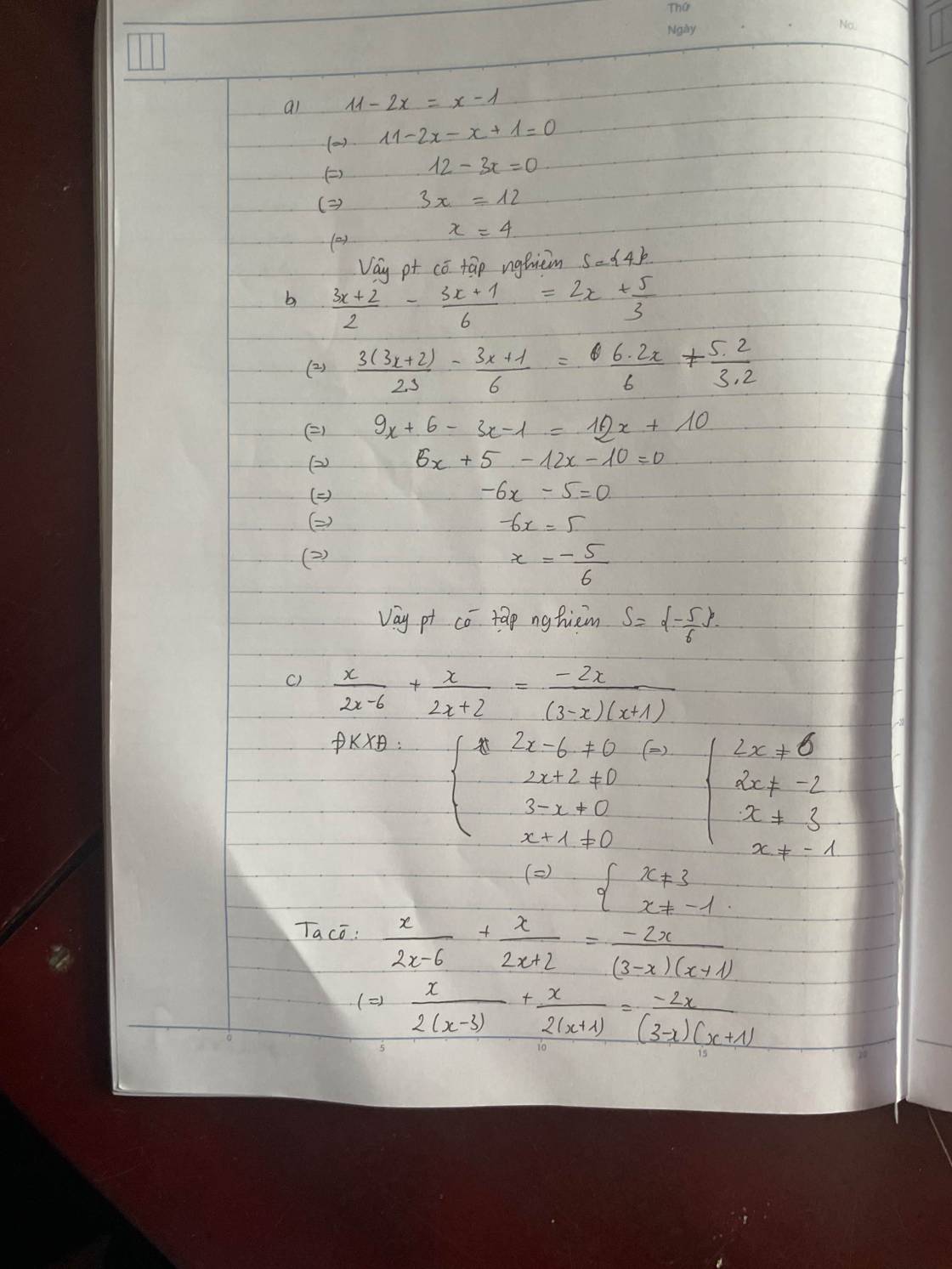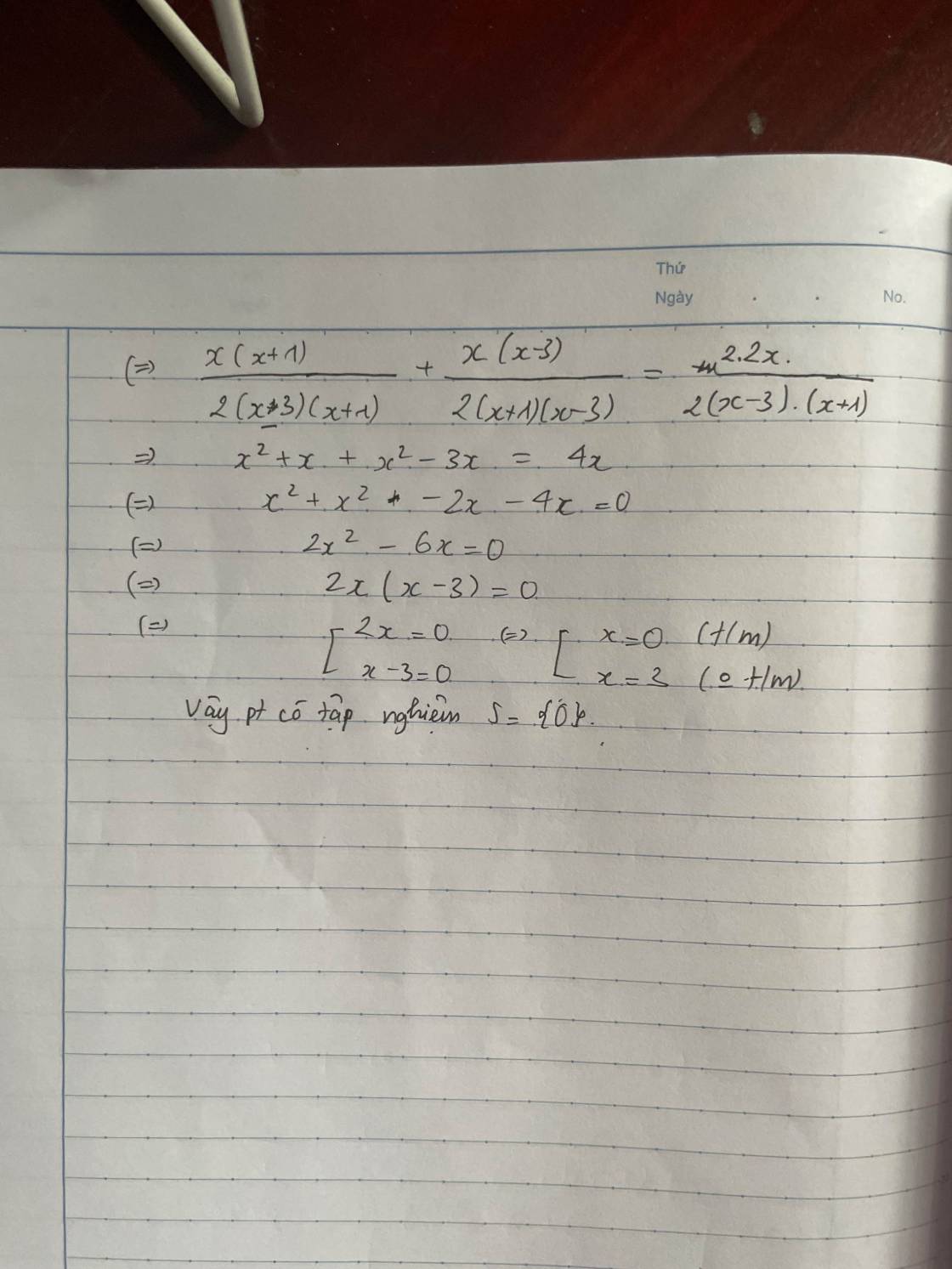Hãy nhập câu hỏi của bạn vào đây, nếu là tài khoản VIP, bạn sẽ được ưu tiên trả lời.

\(\frac{4x^2-6x+5}{2x-1}=2x-2+\frac{3}{2x-1}\)
Để biểu thức có giá trị nguyên thì \(\left(2x-1\right)\inƯ\left(3\right)=\left\{1;-1;3;-3\right\}\)
Với 2x - 1 = 1 => 2x = 2 => x = 1
2x - 1 = -1 => 2x = 0 => x = 0
2x - 1 = 3 => 2x = 4 => x = 2
2x - 1 = -3 => 2x = -2 => x = -1
Vậy x = {1;0;2;-1}

ý 1: khi m=2 thì:
(m + 1 )x - 3 = x + 5
<=>(2+1)x-3=x+5
<=>3x-3=x+5
<=>2x=8
<=>x=4
Vậy khi m=2 thì x=4.
ý 2:
Để pt trên <=> với 2x-1=3x+2
Thì 2 PT phải có cùng tập nghiệm hay nghiệm của 2x-1=3x+2 cũng là nghiệm của PT (m + 1 )x - 3 = x + 5
Ta có: 2x-1=3x+2
<=>x=-3
=>(m+1).(-3)-3=(-3)+5
<=>-3m-3-3=2
<=>-3m=8
<=>m=-8/3
Vậy m=-8/2 thì 2 PT nói trên tương đương với nhau.

\(\frac{x+2}{x+1}=\frac{x}{x+1}+\frac{2}{x+1}\)
\(\frac{2x-3}{x-1}=\frac{2x}{x-1}+\frac{-3}{x-1}\)
\(\frac{x^2-3x+5}{x+1}=\frac{x^2}{x+1}+\frac{-3x+5}{x+1}\)

a: =>-3x=-12
=>x=4
b: =>3(3x+2)-3x-1=12x+10
=>9x+6-3x-1=12x+10
=>12x+10=6x+5
=>6x=-5
=>x=-5/6
c: =>x(x+1)+x(x-3)=4x
=>x^2+x+x^2-3x-4x=0
=>2x^2-6x=0
=>2x(x-3)=0
=>x=3(loại) hoặc x=0(nhận)

a) ĐKXĐ: \(x\notin\left\{-1;0\right\}\)
Ta có: \(\dfrac{x+3}{x+1}+\dfrac{x-2}{x}=2\)
\(\Leftrightarrow\dfrac{x\left(x+3\right)}{x\left(x+1\right)}+\dfrac{\left(x+1\right)\left(x-2\right)}{x\left(x+1\right)}=\dfrac{2x\left(x+1\right)}{x\left(x+1\right)}\)
Suy ra: \(x^2+3x+x^2-3x+2=2x^2+2x\)
\(\Leftrightarrow2x^2+2-2x^2-2x=0\)
\(\Leftrightarrow-2x+2=0\)
\(\Leftrightarrow-2x=-2\)
hay x=1(nhận)
Vậy: S={1}
b) ĐKXĐ: \(x\notin\left\{-7;\dfrac{3}{2}\right\}\)
Ta có: \(\dfrac{3x-2}{x+7}=\dfrac{6x+1}{2x-3}\)
\(\Leftrightarrow\left(3x-2\right)\left(2x-3\right)=\left(6x+1\right)\left(x+7\right)\)
\(\Leftrightarrow6x^2-9x-4x+6=6x^2+42x+x+7\)
\(\Leftrightarrow6x^2-13x+6-6x^2-43x-7=0\)
\(\Leftrightarrow-56x-1=0\)
\(\Leftrightarrow-56x=1\)
hay \(x=-\dfrac{1}{56}\)(nhận)
Vậy: \(S=\left\{-\dfrac{1}{56}\right\}\)
c) ĐKXĐ: \(x\ne-\dfrac{2}{3}\)
Ta có: \(\dfrac{5}{3x+2}=2x-1\)
\(\Leftrightarrow5=\left(3x+2\right)\left(2x-1\right)\)
\(\Leftrightarrow6x^2-3x+4x-2-5=0\)
\(\Leftrightarrow6x^2+x-7=0\)
\(\Leftrightarrow6x^2-6x+7x-7=0\)
\(\Leftrightarrow6x\left(x-1\right)+7\left(x-1\right)=0\)
\(\Leftrightarrow\left(x-1\right)\left(6x+7\right)=0\)
\(\Leftrightarrow\left[{}\begin{matrix}x-1=0\\6x+7=0\end{matrix}\right.\Leftrightarrow\left[{}\begin{matrix}x=1\\6x=-7\end{matrix}\right.\Leftrightarrow\left[{}\begin{matrix}x=1\left(nhận\right)\\x=-\dfrac{7}{6}\left(nhận\right)\end{matrix}\right.\)
Vậy: \(S=\left\{1;-\dfrac{7}{6}\right\}\)
d) ĐKXĐ: \(x\ne\dfrac{2}{7}\)
Ta có: \(\left(2x+3\right)\cdot\left(\dfrac{3x+8}{2-7x}+1\right)=\left(x-5\right)\left(\dfrac{3x+8}{2-7x}+1\right)\)
\(\Leftrightarrow\left(2x+3\right)\cdot\left(\dfrac{3x+8+2-7x}{2-7x}\right)-\left(x-5\right)\left(\dfrac{3x+8+2-7x}{2-7x}\right)=0\)
\(\Leftrightarrow\left(2x+3-x+5\right)\cdot\dfrac{-4x+6}{2-7x}=0\)
\(\Leftrightarrow\left(x+8\right)\cdot\left(-4x+6\right)=0\)(Vì \(2-7x\ne0\forall x\) thỏa mãn ĐKXĐ)
\(\Leftrightarrow\left[{}\begin{matrix}x+8=0\\-4x+6=0\end{matrix}\right.\Leftrightarrow\left[{}\begin{matrix}x=-8\\-4x=-6\end{matrix}\right.\Leftrightarrow\left[{}\begin{matrix}x=-8\left(nhận\right)\\x=\dfrac{3}{2}\left(nhận\right)\end{matrix}\right.\)
Vậy: \(S=\left\{-8;\dfrac{3}{2}\right\}\)

c: \(=\dfrac{x^3+2x+2x^2+2x+x^2-x+1}{\left(x+1\right)\left(x^2-x+1\right)}\)
\(=\dfrac{x^3+3x^2+3x+1}{\left(x+1\right)\left(x^2-x+1\right)}=\dfrac{x^2+2x+1}{x^2-x+1}\)


a/ x.(x + 1)(x2 + x + 1) = 42
=> (x2 + x)(x2 + x + 1) = 42
Đặt a = x2 + x ta đc:
a.(a + 1) = 42
=> a2 + a - 42 = 0
=> (a - 6)(a + 7) = 0
=> a = 6 hoặc a = -7
Với a = 6 => x2 + x = 6 => x2 + x - 6 = 0 => (x - 2)(x + 3) = 0 => x = 2 hoặc x = -3
Với a = -7 => x2 + x = -7 => x2 + x + 7 = 0 , mà x2 + x + 7 > 0 => pt vô nghiệm
Vậy x = 2 , x = -3
b/ (3x - 1)2 - 5(2x + 1)2 + (6x - 3)(2x + 1) = (x - 1)2
=> 9x2 - 6x + 1 - 5.(4x2 + 4x + 1) + (12x2 - 3) = x2 - 2x + 1
=> 9x2 - 6x + 1 - 20x2 - 20x - 5 + 12x2 - 3 - x2 + 2x - 1 = 0
=> - 24x - 8 = 0
=> -24x = 8
=> x = -1/3
Vậy x = -1/3